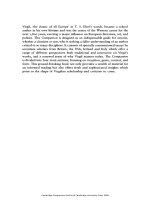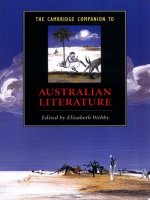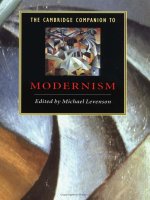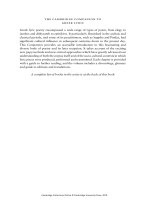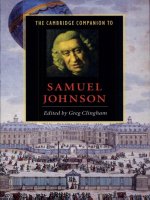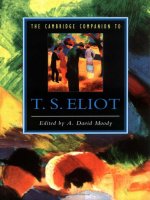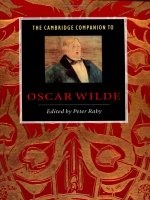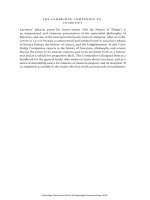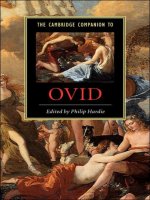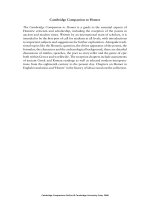The cambridge companion to australian literature
Bạn đang xem bản rút gọn của tài liệu. Xem và tải ngay bản đầy đủ của tài liệu tại đây (19.15 MB, 349 trang )
THE CAMBRIDGE
COMPANION TO
AUSTRALIAN
LITERATURE
This book introduces in a lively and succinct way the major writers, literary
movements, styles and genres that, at the beginning of a new century, are seen
as constituting the field of 'Australian literature'. The book consciously takes
a perspective that sees literary works not as aesthetic objects created in
isolation by unique individuals, but as cultural products influenced and
constrained by the social, political and economic circumstances of their times,
as well as by geographical and environmental factors. It covers Indigenous
texts, colonial writing and reading, poetry, fiction and theatre throughout two
centuries, biography and autobiography, and literary criticism in Australia.
Other features of the companion are a chronology listing significant historical
and literary events, and suggestions for further reading. It will be an
indispensable reference for both national and international readers.
Elizabeth Webby is Professor of Australian Literature and Director of the
Australian Studies program at the University of Sydney. She is the author,
editor and co-editor of many books including The Penguin New Literary
History of Australia (1988), Modern Australian Plays (1990), The Penguin
Book of Australian Ballads (1993), Australian Feminism: A Companion
(1998) and The Letters of Walter and Mary Richardson (2000). For twelve
years she was the editor of the influential literary magazine, Southerly.
Cambridge Companions Online © Cambridge University Press, 2006
Cambridge Companions Online © Cambridge University Press, 2006
CAMBRIDGE COMPANIONS TO LITERATURE
The Cambridge Companion to Greek Tragedy
edited by RE. Easterling
The Cambridge Companion to Virgil
edited by Charles Martindale
The Cambridge Companion to Old English
Literature
edited by Malcolm Godden and Michael
Lapidge
The Cambridge Companion to Dante
edited by Rachel Jacoff
The Cambridge Chaucer Companion
edited by Piero Boitani and Jill Mann
The Cambridge Companion to Medieval
English Theatre
edited by Richard Beadle
The Cambridge Companion to Renaissance
Humanism
edited by Jill Kraye
The Cambridge Companion to English
Renaissance Drama
edited by A.R. Braunmuller and Michael
Hattaway
The Cambridge Companion to Shakespeare
Studies
edited by Stanley Wells
The Cambridge Companion to English Poetry,
Donne to Marvell
edited by Thomas N. Corns
The Cambridge Companion to Milton
edited by Dennis Danielson
The Cambridge Companion to English
Literature, 1500-1600
edited by Arthur E Kinney
The Cambridge Companion to English
Literature, 1650-1740
edited by Steven N. Zwicker
The Cambridge Companion to British
Romanticism
edited by Stuart Curran
The Cambridge Companion to the
Eighteenth-Century Novel
edited by John Richetti
The Cambridge Companion to Samuel Johnson
edited by Greg Clingham
The Cambridge Companion to Jane Austen
edited by Edward Copeland and
Juliet McMaster
The Cambridge Companion to Oscar Wilde
edited by Peter Raby
The Cambridge Companion to Thomas Hardy
edited by Dale Kramer
The Cambridge Companion to George
Bernard Shaw
edited by Christopher Innes
The Cambridge Companion to Joseph Conrad
edited by J.H. Stape
The Cambridge Companion to James Joyce
edited by Derek Attridge
The Cambridge Companion to T.S. Eliot
edited by A. David Moody
The Cambridge Companion to Ezra Found
edited by Ira B. Nadel
The Cambridge Companion to Modernism
edited by Michael Levenson
The Cambridge Companion to Virginia Woolf
edited by Sue Roe and Susan Sellers
The Cambridge Companion to Henry David
Thoreau
edited by Joel Myerson
The Cambridge Companion to Walt Whitman
edited by Ezra Greenspan
The Cambridge Companion to Mark Twain
edited by Forrest G. Robinson
The Cambridge Companion to American
Realism and Naturalism
edited by Donald Pizer
The Cambridge Companion to Edith Wharton
edited by Millicent Bell
The Cambridge Companion to Ernest
Hemingway
edited by Scott Donaldson
The Cambridge Companion to William
Faulkner
edited by Philip M. Weinstein
The Cambridge Companion to Eugene O'Neill
edited by Michael Manheim
The Cambridge Companion to Tennessee
Williams
edited by Matthew C. Roudane
The Cambridge Companion to Arthur Miller
edited by Christopher Bigsby
The Cambridge Companion to American
Women Playwrights
edited by Brenda Murphy
The Cambridge Companion to the French
Novel: from 1800 to the present
edited by Timothy Unwin
The Cambridge Companion to the Classic
Russian Novel
edited by Malcolm V. Jones and Robin Feuer
Miller
The Cambridge Companion to Ibsen
edited by James McFarlane
The Cambridge Companion to Brecht
edited by Peter Thomson and Glendyr Sacks
The Cambridge Companion to Beckett
edited by John Pilling
Cambridge Companions Online © Cambridge University Press, 2006
CAMBRIDGE COMPANIONS TO CULTURE
The Cambridge Companion to Modern
German Culture
edited by Eva Kolinsky and Wilfried
van der Will
The Cambridge Companion to Modern
Russian Culture
edited by Nicholas Rzhevsky
The Cambridge Companion to Modern
Spanish Culture
edited by David T. Gies
Cambridge Companions Online © Cambridge University Press, 2006
THE CAMBRIDGE
COMPANION TO
AUSTRALIAN
LITERATURE
EDITED BY
ELIZABETH WEBBY
CAMBRIDGE
UNIVERSITY PRESS
Cambridge Companions Online © Cambridge University Press, 2006
CAMBRIDGE UNIVERSITY PRESS
Cambridge, New York, Melbourne, Madrid, Cape Town, Singapore, Sao Paulo
Cambridge University Press
The Edinburgh Building, Cambridge CB2 2RU, UK
Published in the United States of America by Cambridge University Press, New York
www.cambridge.org
Information on this title: www.cambridge.org/0521651220
© Cambridge University Press 2000
This publication is in copyright. Subject to statutory exception
and to the provisions of relevant collective licensing agreements,
no reproduction of any part may take place without
the written permission of Cambridge University Press.
First published 2000
A catalogue recordfor this publication is available from the British Library
National Library of Australia Cataloguing in Publication data
The Cambridge companion to Australian literature.
Includes index.
ISBN 0 521 65122 0.
ISBN 0 521 65843 8 (pbk.).
1. Australian literature - History and criticism.
2. Australia - In literature. I. Webby, Elizabeth. II. Title:
Australian literature. (Series: Cambridge companions
to literature.)
A820.9
ISBN-10 0-521-65122-0 hardback
ISBN-10 0-521-65843-8 paperback
Transferred to digital printing 2005
Cambridge Companions Online © Cambridge University Press, 2006
CONTENTS
page ix
xi
List of contributors
Chronology
Introduction
ELIZABETH WEBBY
i
1
Indigenous texts and narratives
PENNY VAN TOORN
19
2
Colonial writers and readers
ELIZABETH WEBBY
50
3
Poetry from the 1890s to 1970
MICHAEL ACKLAND
74
4
Fiction from 1900 to 1970
KERRYN GOLDSWORTHY
105
5
Theatre from 1788 to the 1960s
RICHARD FOTHERINGHAM
134
6
Contemporary poetry: across party lines
DAVID McCOOEY
158
7
New narrations: contemporary
DELYS BIRD
8
New stages: contemporary theatre
MAY-BRIT AKERHOLT
fiction
183
209
Vll
Cambridge Companions Online © Cambridge University Press, 2006
CONTENTS
9
From biography to autobiography
232
GILLIAN WHITLOCK
10
Critics, writers, intellectuals: Australian literature and its criticism
DAVID CARTER
258
Further reading
Index
294
3 00
Vlll
Cambridge Companions Online © Cambridge University Press, 2006
CONTRIBUTORS
MICHAEL ACKLAND is a Reader in English at Monash University. His publications
include four editions of nineteenth-century prose and verse and four monographs:
That Shining Band: A Study of Australian Colonial Verse Tradition (1994), Henry
Kendall: The Man and the Myths (1995), Henry Handel Richardson (1996) and
Damaged Men: The Lives of James McAuley and Harold Stewart (2000). He is
currently researching the place of the grotesque in Australian culture.
MAY-BRIT AKERHOLT is the Artistic Director of the Australian National Playwrights' Centre. She was resident dramaturg at the Sydney Theatre Company for
six years and before that, lecturer in drama at NIDA, and tutor in English at
Macquarie University. She has translated eighteen plays for the Australian stage,
and has published numerous articles about translation, theatre and writing for
performance, as well as a study of Patrick White's plays (1988).
DELYS BIRD teaches in the English Department at the University of Western
Australia in Australian literary and cultural studies and women's studies and is one
of the editors of Westerly. She has published on Australian women's writing from
the colonial period to the contemporary, and has edited a collection of Elizabeth
Jolley's radio plays, Off the Air (1995); a book on women and detective fiction,
Killing Women (1993); and co-edited collections of essays on Elizabeth Jolley's
fiction (1991) and Sally Morgan's My Place (1992).
DAVID CARTER teaches literature and cultural studies in the School of Humanities,
Griffith University, Brisbane, and is President of the International Australian
Studies Association. His publications include A Career in Writing: Judah Waten
and the Cultural Politics of a Literary Career (1997) and a number of edited
books, The Republicanism Debate (1993), Outside the Book: Contemporary
Essays on Literary Periodicals (1999) and Judah Waten: Fiction, Memoirs,
Criticism (1998). He is currently writing a history of twentieth-century magazine
publication in Australia.
ix
Cambridge Companions Online © Cambridge University Press, 2006
CONTRIBUTORS
RICHARD FOTHERINGHAM is Head of the English Department and Reader in
Drama at the University of Queensland. His major publications include a study of
sport in Australian drama and film (1992), and a biography of the short story
writer and playwright Steele Rudd (1995), a s w e ^ a s numerous articles on
Australian theatre, film and the performing arts as an industry. He is currently
editing two collections of early Australian plays for publication in the Academy
Editions of Australian Literature series.
KERRYN GOLDSWORTHY taught Australian literature, women's studies, Victorian
literature and creative writing in the Department of English and Cultural Studies
at the University of Melbourne for seventeen years; she resigned in 1997 to
become an independent scholar and writer. She has edited four anthologies of
Australian writing and has written a collection of short stories (North of the
Moonlight Sonata, 1989) and a monograph on the work of Helen Garner (1996).
She was editor of Australian Book Review from 1986-87.
DAVID McCOOEY lectures in literary studies at Deakin University (Geelong). He
is the author of Artful Histories: Modern Australian Autobiography (1996),
which won a NSW Premier's Literary Award. He has published widely on
Australian poetry in journals such as Australian Literary Studies and Southerly,
and his reviews and poems have appeared in many national and international
publications.
PENNY VAN TOORN is a lecturer in Australian literature and Australian studies at
the University of Sydney. She is the author of Rudy Wiebe and the Historicity of
the Word (1995), and co-editor of Speaking Positions: Aboriginally, Gender and
Ethnicity in Australian Cultural Studies (1995). She has published extensively on
postcolonial literatures and theory, focusing particularly on writings by and about
indigenous peoples of Australia and Canada.
ELIZABETH WEBBY is Professor of Australian Literature and Director of the
Australian Studies Program at the University of Sydney. She has published many
books and articles on Australian literature and literary culture. From 1988-99 she
was editor of Southerly, Australia's oldest literary magazine.
GILLIAN WHITLOCK is Head of the School of Humanities at Griffith University. Her
publications on autobiography include The Intimate Empire. Reading Women's
Autobiography (2000) and an edition of contemporary Australian autobiography,
Autographs (1996).
x
Cambridge Companions Online © Cambridge University Press, 2006
CHRONOLOGY
This chronology provides a basic framework of dates in Australian history,
together with major literary and cultural events, and selected publications of
particular historical or literary significance.
40,000 BC
20,000 BC
14,000 BC
12,000 BC
1616
1642
1703
1770
1788
1789
1802
1803
1813
1816
1819
Aboriginal peoples living on Australian continent from at least
this time.
Rock art in Western Arnhem Land depicts now-extinct
animals.
Tasmania separated from mainland at end of glacial period.
Archaeological evidence of use of boomerangs for hunting.
Dirk Hartog makes first recorded European landing on
Australian continent, in Western Australia.
Abel Tasman lands at Blackman's Bay, Van Diemen's Land.
William Dampier, A Voyage to New Holland in the Year 1699.
James Cook lands in Botany Bay, later names and takes
possession of New South Wales for Britain.
First Fleet arrives and establishes penal settlement at Sydney
and later at Norfolk Island.
Convict production in Sydney of George Farquhar's The
Recruiting Officer.
The Voyage of Governor Phillip to Botany Bay.
Watkin Tench, A Narrative of the Expedition to Botany Bay.
George Howe prints first Australian book, the NSW General
Standing Orders.
Settlement established in Van Diemen's Land, near Hobart.
First issue of Sydney Gazette (1803-42).
First European crossing of Blue Mountains, west of Sydney.
First issue of Hobart Town Gazette.
Barron Field, First Fruits of Australian Poetry.
XI
Cambridge Companions Online © Cambridge University Press, 2006
CHRONOLOGY
1821
First locally produced periodical, the Australian Magazine
1824
1826
Penal settlement established at Moreton Bay.
Establishment of Australian Subscription Library in Sydney.
Charles Tompson, Wild Notes from the Lyre of a Native
Minstrel.
Establishment of Hobart Town Mechanics' Institute.
Establishment of Swan River Colony in Western Australia.
Henry Savery, The Hermit in Van Diemen's Land.
Henry Savery, Quintus Servinton.
First issue of Sydney Herald (still publishing, as Sydney
Morning Herald).
First settlers arrive in Port Phillip district, later Victoria.
Charles Sturt, Two Expeditions into the Interior of Southern
Australia.
South Australia established as a colony of free settlers.
George Bennett, Wanderings in New South Wales.
Anna Maria Bunn, The Guardian.
T.L. Mitchell, Three Expeditions into the Interior of Eastern
Australia.
Transportation of convicts to NSW ceases.
First issue of Port Phillip Herald (still publishing as HeraldSun News).
Charlotte Barton, A Mother's Offering to Her Children.
Charles Rowcroft, Tales of the Colonies.
Louisa Ann Meredith, Notes and Sketches of New South Wales.
Edward Geoghegan, The Currency Lass.
Charles Harpur, Thoughts: a Series of Sonnets.
Thomas McCombie, Arabin, or the Adventures of a Colonist
in New South Wales.
Mary Vidal, Tales for the Bush.
Moreton Bay Courier established (still publishing as CourierMail^ Brisbane).
Alexander Harris, Settlers and Convicts.
Alexander Harris, The Emigrant Family.
First convicts sent to Western Australia.
University of Sydney established.
Colony of Victoria gains independence from NSW.
Gold discovered in NSW and Victoria.
First mail steamer arrives in Sydney from England.
G.C. Mundy, Our Antipodes.
(1821-22).
1827
1829
1830-31
1831
1833
1836
1838
1840
1841
1843
1844
1845
1846
1847
1849
1850
18 51
1852
xii
Cambridge Companions Online © Cambridge University Press, 2006
CHRONOLOGY
1853
1854
1855
1856
1858
1859
1863
1865
1866
1867
1868
1869
1870
1873
1874
1876
1880
18 81
1883
1886
1887
1888
Last convicts arrive in Van Diemen's Land.
Charles Harpur, The Bushrangers and other poems.
Eureka Stockade, unsuccessful rebellion of miners at Ballarat,
Victoria.
The Age established (Melbourne, still publishing).
Catherine Helen Spence, Clara Morison.
Melbourne Punch established (1855-1929).
Raffaello Carboni, The Eureka Stockade.
William Howitt, Land, Labour and Gold.
Van Diemen's Land renamed Tasmania.
South Australian Advertiser established (still publishing).
Queensland becomes a separate colony.
Henry Kingsley, The Recollections of Geoffry Hamlyn.
Caroline Leakey, The Broad Arrow.
Northern Territory separated from NSW.
First issue of Australian Journal (1865-1962).
G.B. Barton, Literature in New South Wales.
Gold rushes begin in Queensland.
Cessation of convict transportation to Western Australia.
Henry Kendall, Leaves from Australian Forests.
Adam Lindsay Gordon, Bush Ballads and Galloping Rhymes.
Garnet Walch, Australia Felix.
Marcus Clarke, His Natural Life.
First issue of the Melbourne Review (1876-8 5).
Bushranger Ned Kelly captured and hanged in Melbourne.
Bulletin established (Sydney, still publishing).
Henry Kendall, Songs from the Mountains.
Rosa Praed, An Australian Heroine.
Rosa Praed, Policy and Passion.
First regular train service between Sydney and Melbourne.
George Darrell, The Sunny South.
Francis Adams, Australian Essays.
Fergus Hume, The Mystery of a Hansom Cab.
Ada Cambridge, Unspoken Thoughts.
First issue of The Dawn: A Journal for Australian Women
(1888-1905).
1889
1890
Rolf Boldrewood, Robbery Under Arms.
Jessie Couvreur ("Tasma"), Uncle Piper of Piper's Hill.
Ernest Giles, Australia Twice Traversed.
Ada Cambridge, A Marked Man.
Catherine Martin, An Australian Girl.
xin
Cambridge Companions Online © Cambridge University Press, 2006
CHRONOLOGY
1891
1892
1893
1894
1895
1896
1898
1899
1901
1902
1903
1905
1906
1908
1910
1911
1912
1913
1915
Major shearers' strikes in Queensland, in January and June.
Ada Cambridge, The Three Miss Kings.
Gold discovered in Western Australia.
William Lane, The Workingman's Paradise.
Price Warung, Tales of the Convict System.
Major depression and drought.
Francis Adams, The Australians.
Women's suffrage attained in South Australia.
Henry Lawson, Short Stories in Prose and Verse.
Ethel Turner, Seven Little Australians.
Angus &c Robertson publishes A.B. Paterson's The Man from
Snowy River (10,000 copies sold in first year).
First film made in Australia.
Henry Lawson, While the Billy Boils.
David Carnegie, Spinifex and Sand.
H.G. Turner and Alexander Sutherland, The Development of
Australian Literature.
Steele Rudd, On Our Selection.
Australia becomes a federation and first Commonwealth
Parliament opened.
Miles Franklin, My Brilliant Career.
Henry Lawson, Joe Wilson and His Mates.
Barbara Baynton, Bush Studies.
Joseph Furphy, Such is Life.
A.B. Paterson, ed., Old Bush Songs.
British New Guinea becomes a territory of the Commonwealth.
Commonwealth Literary Fund established.
EJ. Banfield, Confessions of a Beachcomber.
Jeannie Gunn, We of the Never Never.
Henry Handel Richardson, Maurice Guest.
Charles Bean, On the Wool Track.
Mary Grant Bruce, A Little Bush Maid.
Mary Gilmore, Marri'd.
Henry Handel Richardson, The Getting of Wisdom.
Louis Stone, Jonah.
Louis Esson, The Time is Not Yet Ripe.
Bernard O'Dowd, The Bush.
Christopher Brennan, Poems.
Allied landing at Gallipoli in Turkey on 25 April, later commemorated as Anzac Day.
xiv
Cambridge Companions Online © Cambridge University Press, 2006
CHRONOLOGY
1918
1 1
99
1920
1923
1925
1926
1928
1929
1930
1931
1932
1934
1936
1937
1938
1939
1940
1941
CJ. Dennis, The Songs of a Sentimental Bloke.
May Gibbs, Snugglepot and Cuddlepie.
Mary Gilmore, The Passionate Heart.
Norman Lindsay, The Magic Pudding.
John Shaw Neilson, Heart of Spring.
Establishment of QANTAS (Queensland and Northern Territory Aerial Services).
Opening of first public radio station in Sydney.
D.H. Lawrence, Kangaroo.
Mary Gilmore, The Tilted Cart.
K.S. Prichard, Working Bullocks.
Martin Boyd, The Montforts.
Miles Franklin, Up the Country.
M. Barnard Eldershaw, A House is Built.
K.S. Prichard, Coonardoo.
David Unaipon, Native Legends.
Norman Lindsay, Redheap.
Vance Palmer, The Passage.
Henry Handel Richardson, The Fortunes of Richard Mahony.
Ion Idriess, Lasseter's Last Ride.
ABC established as national broadcaster.
Official opening of Sydney Harbour Bridge.
Kenneth Slessor, Cuckooz Country.
Eleanor Dark, Prelude to Christopher.
Brian Penton, Landtakers.
Christina Stead, Seven Poor Men of Sydney.
Dymphna Cusack, Jungfrau.
Jean Devanny, Sugar Heaven.
Kenneth Mackenzie, The Young Desire It.
K.S. Prichard, Intimate Strangers.
Sesquicentenary celebrations: Aborigines' Progressive Association declares 26 January a "day of mourning".
Xavier Herbert's Capricornia wins Sesquicentenary Prize for
Fiction.
Expansion of Commonwealth Literary Fund.
First issue of Southerly.
Kenneth Slessor, Five Bells.
Patrick White, Happy Valley.
First issue of Meanjin.
Christina Stead, The Man Who Loved Children.
Eleanor Dark, The Timeless Land.
xv
Cambridge Companions Online © Cambridge University Press, 2006
CHRONOLOGY
1942
1943
1944
1945
1946
1947
1948
1949
1950
19 51
1952
1954
1955
1956
1957
1958
Kylie Tennant, The Battlers.
Japan bombs Darwin; Japanese submarines in Sydney Harbour.
Gavin Casey, It's Harder for Girls.
Eve Langley, The Pea Pickers.
Douglas Stewart, Ned Kelly.
Kylie Tennant, Ride on Stranger.
Ern Malley hoax.
Kenneth Slessor, One Hundred Poems.
Christina Stead, For Love Alone.
Australian Book Council formed in Sydney.
Children's Book of the Year Award begins.
Martin Boyd, Lucinda Brayford.
Judith Wright, The Moving Image.
European migration program begins.
M. Barnard Eldershaw, Tomorrow and Tomorrow and
Tomorrow.
Francis Webb, A Drum for Ben Boyd.
Patrick White, The Aunfs Story.
Judith Wright, Woman to Man.
Menzies' government introduces Communist Party Dissolution Bill.
Frank Hardy, Power Without Glory.
Nevil Shute, A Town Like Alice.
Dymphna Cusack and Florence James, Come in Spinner.
Martin Boyd, The Cardboard Crown.
Judah Waten, Alien Son.
Establishment of Elizabethan Theatre Trust.
Overland, incorporating Realist Writer, begins publication.
Mary Gilmore, Fourteen Men.
Vance Palmer, The Legend of the Nineties.
First full-year university course in Australian Literature (at
Canberra University College).
A.D. Hope, The Wandering Islands.
Ray Lawler, Summer of the Seventeenth Doll.
Patrick White, The Tree of Man.
Olympic Games held in Melbourne.
Regular television transmission commences in Australia.
First issues of Quadrant and Westerly.
Ethel Anderson, At Parramatta.
Patrick White's Voss wins first Miles Franklin Award.
National Institute of Dramatic Art established.
xvi
Cambridge Companions Online © Cambridge University Press, 2006
CHRONOLOGY
1959
1960
19 61
1962
1963
1964
1965
1966
1967
1968
1969
1970
1971
Elizabeth Harrower, The Long Prospect.
Randolph Stow, To the Islands.
R.D. FitzGerald, The Wind at Your Door.
Dorothy Hewett, Bobbin Up.
First Adelaide Festival of the Arts held.
Alan Seymour, The One Day of the Year.
H.M. Green, A History of Australian Literature.
Patrick White, Riders in the Chariot.
First chair of Australian Literature established at University
of Sydney.
Thea Astley, The Well Dressed Explorer.
Hal Porter, A Bachelor's Children.
Establishment of Australian Society of Authors.
First issue of Australian Literary Studies.
Hal Porter, The Watcher on the Cast-Iron Balcony.
Randolph Stow, Tourmaline.
Donald Home, The Lucky Country.
George Johnston, My Brother Jack.
Oodgeroo Noonuccal (Kath Walker), We Are Going.
Australian troops sent to Vietnam.
Mudrooroo (Colin Johnson), Wild Cat Falling.
Patrick White, Four Plays.
Judith Wright, Preoccupations in Australian Poetry.
Introduction of decimal currency.
Elizabeth Harrower, The Watch Tower.
A.D. Hope, Collected Poems 1930-65.
Referendum allows Aboriginal Australians to be recognised as
Australian citizens.
Establishment of Australia Council for the Arts.
Alex Buzo, Norm and Ahmed.
Joan Lindsay, Picnic at Hanging Rock.
Women granted equal pay for work of equal value.
Bruce Beaver, Letters to Live Poets.
James McAuley, Surprises of the Sun.
Les Murray, The Weatherboard Cathedral.
Francis Webb, Collected Poems.
Germaine Greer, The Female Eunuch.
Patrick White, The Vivisector.
Bruce Dawe, Condolences of the Season.
David Ireland, The Unknown Industrial Prisoner.
James McAuley, Collected Poems.
xvii
Cambridge Companions Online © Cambridge University Press, 2006
CHRONOLOGY
1972
1973
1974
1975
1976
1977
1978
1979
1980
David Williamson, The Removalists.
Australian Labor Party wins government and withdraws
troops from Vietnam.
Aborigines set up "tent embassy" at Parliament House,
Canberra.
Thea Astley, The Acolyte.
Dorothy Hewett, The Chapel Perilous.
Jack Hibberd, A Stretch of the Imagination.
Thomas Keneally, The Chant ofjimmie Blacksmith.
Frank Moorhouse, The Americans, Baby.
Sydney Opera House opened.
Patrick White wins the Nobel Prize for Literature.
Rosemary Dobson, Selected Poems.
Patrick White, The Eye of the Storm.
End of the "White Australia" policy, which restricted immigration of non-Europeans.
Thea Astley, A Kindness Cup.
Peter Carey, The Fat Man in History.
Les Murray, Lunch and Counter Lunch.
Dismissal of Whitlam government by Governor-General.
Gwen Harwood, Selected Poems.
Xavier Herbert, Poor Fellow My Country.
David Malouf, Johnno.
Vincent Buckley, Golden Builders.
Robert Drewe, The Savage Crows.
Les Murray, Selected Poems.
Patrick White, A Fringe of Leaves.
Foundation of the Association for the Study of Australian
Literature.
Robert Adamson, Selected Poems.
Helen Garner, Monkey Grip.
Kevin Gilbert, Living Black.
Sydney Gay and Lesbian Mardi Gras established.
Jessica Anderson, Tirra Lirra by the River.
Bruce Dawe, Sometimes Gladness.
Christopher Koch, The Year of Living Dangerously.
David Malouf, An Imaginary Life.
Bruce Beaver, Selected Poems.
Randolph Stow, Visitants.
Patrick White, The Twyborn Affair.
Murray Bail, Homesickness.
xviii
Cambridge Companions Online © Cambridge University Press, 2006
CHRONOLOGY
1981
1982
1983
1984
1985
1986
1987
1988
1989
Robyn Davidson, Tracks.
Barbara Hanrahan, The Frangipani Gardens.
Shirley Hazzard, The Transit of Venus.
Les Murray, The Boys Who Stole the Funeral.
Vincent Buckley, Selected Poems.
Albert Facey, A Fortunate Life.
David Foster, Moonlite.
Patrick White, Flaws in the Glass.
Thomas Keneally, Schindler's Ark.
Olga Masters, The Home Girls.
Les Murray, The Vernacular Republic.
John Tranter, Selected Poems.
Election of Bob Hawke's Labor government.
Beverley Farmer, Milk.
Elizabeth Jolley, Miss Peabody's Inheritance.
Mudrooroo, Doctor Wooreddy's Prescription for Enduring
the Ending of the World.
Les Murray, The People's Otherworld.
Rosa Cappiello, Oh Lucky Country.
Rosemary Dobson, The Three Fates and other poems.
Helen Garner, The Children's Bach.
Peter Carey, Illywhacker.
Jack Davis, No Sugar.
Kate Grenville, Lilian's Story.
Janette Turner Hospital, Borderline.
Louis Nowra, The Golden Age.
Michael Gow, Away.
Elizabeth Jolley, The Well.
Christina Stead, I'm Dying Laughing.
Thea Astley, It's Raining in Mango.
Laurie Duggan, The Ash Range.
Sally Morgan, My Place.
Gerald Murnane, Landscape with Landscape.
Bicentenary celebration accompanied by strong Aboriginal
protests.
Peter Carey, Oscar and Lucinda.
John Forbes, The Stunned Mullet.
Ruby Langford Ginibi, Don't Take Your Love to Town.
Tim Winton, In the Winter Dark.
Robert Adamson, The Clean Dark.
Mary Fallon, Working Hot.
xix
Cambridge Companions Online © Cambridge University Press, 2006
CHRONOLOGY
1990
1991
1992
1993
1994
1995
1996
1997
1998
Elizabeth Jolley, My Father's Moon.
Thea Astley, Reaching Tin River.
Jimmy Chi, Bran Nue Dae.
Beverley Farmer, A Body of Water.
Dorothy Hewett, Wild Card.
David Malouf, The Great World.
Vincent Buckley, Last Poems.
Drusilla Modjeska, Poppy.
Mudrooroo, Master of the Ghost Dreaming.
Tim Winton, Cloudstreet.
Mabo land rights decision of High Court of Australia.
Thea Astley, Vanishing Points.
Brian Castro, After China.
Les Murray, Translations from the Natural World.
John Tranter, The Floor of Heaven.
Mandawuy Yunupingu is first Aboriginal to be chosen Australian of the Year.
David Malouf, Remembering Babylon.
Frank Moorhouse, Grand Days.
John Scott, What I Have Written.
Robert Adamson, Waving to Hart Crane.
Kevin Gilbert, Black from the Edge.
Rodney Hall, The Yandilli Trilogy.
Dorothy Porter, The Monkey's Mask.
National inquiry into the "stolen generations" begins.
Peter Carey, The Unusual Life of Tristan Smith.
Helen Garner, The First Stone.
Robert Gray, New and Selected Poems.
J.S. Harry, The Life on Water and the Life Beneath.
John Kinsella, The Silo.
David Williamson, Dead White Males.
Election of John Howard's Liberal government.
Robert Dessaix, Night Letters.
Robert Drewe, The Drowner.
David Foster, The Glade within the Grove.
Les Murray, Subhuman Redneck Poems.
Peter Carey, Jack Maggs.
Roberta Sykes, Snake Cradle.
Fay Zwicky, The Gatekeeper's Wife.
"Stolen generations" report delivered, with pressure on Howard
government to apologise for mistreatment of Aboriginal peoples.
xx
Cambridge Companions Online © Cambridge University Press, 2006
CHRONOLOGY
1999
2000
Murray Bail, Eucalyptus.
John Forbes, Damaged Glamour.
Roger McDonald, Mr Darwin's Shooter.
Les Murray, Fredy Neptune.
Gig Ryan, Pure and Applied.
Archie Weller, Land of the Golden Clouds.
Republic referendum held.
Thea Astley, Drylands.
Kate Grenville, The Idea of Perfection.
Drusilla Modjeska, Stravinsky's Lunch.
Les Murray, Conscious and Verbal.
Olympic Games held in Sydney.
XXI
Cambridge Companions Online © Cambridge University Press, 2006
Cambridge Companions Online © Cambridge University Press, 2006
ELIZABETH WEBBY
Introduction
In 1898, Henry Gyles Turner, a banker and litterateur, and Alexander
Sutherland, a schoolteacher and journalist, both from Melbourne, published
The Development of Australian Literature. This opened with the first of
many attempts to provide "A General Sketch of Australian Literature",
which devoted forty-seven pages to poetry, about thirty to fiction and
eighteen to "general literature": mainly history, biography, and works of
travel and exploration. The bulk of Turner and Sutherland's book, however,
consisted of biographies of the three Australian writers whom they thought
were of greatest significance: poets Adam Lindsay Gordon and Henry
Kendall and novelist Marcus Clarke.
Turner and Sutherland's privileging of poetry, inclusion of what we would
now call "non-fiction" and exclusion of more popular genres like children's
writing and drama established a view of the terrain of Australian literature
which was to hold good for at least the first half of the twentieth century.
Further introductory accounts were provided by Nettie Palmer in 1924, the
American historian and critic C. Hartley Grattan in 1929, and H.M. Green
in 1930. In 1961 Green finally followed this up by producing his monumental two-volume A History of Australian Literature Pure and Applied.
As its title indicates, Green's account was by far the most comprehensive yet
to appear, not only discussing the "pure" categories of poetry, fiction and
drama, but a very wide range of "applied" works, from newspapers and
magazines through to works of philosophy and anthropology. Indeed, for
the period it covers - 1789-1950 - Green's is effectively a history of the
Australian book and so has proved of continuing value as a work of
reference.
To bring some order to this immense range and amount of material, Green
used period as well as genre divisions. The periods he chose, and the names
he gave to them, reflected the then dominant progressivist model of literary
history. So, for Green, to trace the history of Australian literature was
to trace an inevitable development from initial "conflict" (1789-1850),
1
Cambridge Companions Online © Cambridge University Press, 2006
ELIZABETH WEBBY
through "consolidation" (i850-1890) and "self-conscious nationalism"
(1890-1923), to "world consciousness and disillusion" (1923-1950). In
particular, his decision to begin a new period with 1890 reflected the then
current emphasis on the 1890s as the period when Australian literature
changed from being a colonial to a truly national one.
The next substantial critical survey of Australian literature, Geoffrey
Dutton's edited collection of essays The Literature of Australia, appeared
soon after Green's. Published by Penguin Books in 1964, it was clearly
modelled on the then very popular paperback volumes of The Pelican Guide
to English Literature, which Penguin had been publishing since the 1950s.
Coincidentally, however, Dutton's Penguin was also remarkably like Turner
and Sutherland's earlier work in its approach to Australian literary history:
some general survey essays, giving overviews of Australian history and of
fiction and poetry, were followed by others mainly on individual authors. As
with Turner and Sutherland, too, there was some privileging of poetry, with
twelve out of twenty-two chapters being devoted to it, as against seven on
fiction and one on drama. While the survey chapters divided at 1920, a
chapter devoted to "The Bulletin - J.F. Archibald and A.G. Stephens"
indicated that the 1890s were still seen as crucial to the development of a
national literature.
As an affordable introduction to Australian literature, at a time when it
was just beginning to be more widely taught in schools and universities,
Dutton's Literature of Australia sold very well and a second edition was
issued in 1976. The basic structure and many of the chapters remained the
same, though changes in the canon of Australian literature over these twelve
years saw chapters on novelists Christina Stead and Martin Boyd, and poet
Francis Webb, replace earlier ones on nineteenth-century poets, nineteenthcentury novelists and the poet R.D. FitzGerald.
Leonie Kramer, whose essay on Henry Handel Richardson had appeared
in both editions of Dutton, and who had become Professor of Australian
Literature at the University of Sydney in 1968, was the next to plan a
history. As editor of The Oxford History of Australian Literature (1981),
she chose a model closer to Green's than to Dutton's, though without
Green's period divisions and with a focus on only the "pure" literary genres
of poetry, fiction and drama. For her, it seems, the crucial thing to concentrate on was the aesthetic quality of a work, in order to establish a
reliable canon of major authors to be studied in the then burgeoning
discipline of Australian literature. By the 1980s, however, structuralist and
poststructuralist theories had begun to have an impact on Australian English
departments. So The Oxford History of Australian Literature received a less
2
Cambridge Companions Online © Cambridge University Press, 2006
